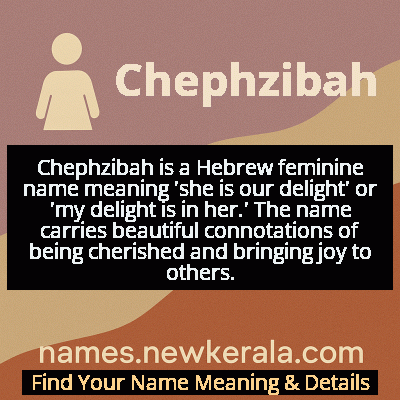Chephzibah Name Meaning & Details
Origin, Popularity, Numerology Analysis & Name Meaning of Chephzibah
Discover the origin, meaning, and cultural significance of the name CHEPHZIBAH. Delve into its historical roots and explore the lasting impact it has had on communities and traditions.
Name
Chephzibah
Gender
Female
Origin
Hebrew
Lucky Number
5
Meaning of the Name - Chephzibah
Chephzibah is a Hebrew feminine name meaning 'she is our delight' or 'my delight is in her.' The name carries beautiful connotations of being cherished and bringing joy to others.
Chephzibah - Complete Numerology Analysis
Your Numerology Number
Based on Pythagorean Numerology System
Ruling Planet
Mercury
Positive Nature
Adventurous, dynamic, curious, and social.
Negative Traits
Restless, impatient, inconsistent, prone to indulgence.
Lucky Colours
Green, white.
Lucky Days
Wednesday.
Lucky Stones
Emerald.
Harmony Numbers
1, 3, 9.
Best Suited Professions
Sales, marketing, travel, entertainment.
What People Like About You
Versatility, charisma, adventurous spirit.
Famous People Named Chephzibah
Hephzibah Menuhin
Concert pianist and humanitarian
Renowned concert pianist, sister of violinist Yehudi Menuhin, and dedicated humanitarian worker
Hephzibah Anderson
Journalist and author
British journalist and author known for her cultural criticism and memoir writing
Hephzibah House
Religious institution founder
Founded a Christian girls' home and school, though controversial in later years
Name Variations & International Equivalents
Click on blue names to explore their detailed meanings. Gray names with will be available soon.
Cultural & Historical Significance
The name has traveled through various cultural contexts, from its ancient Hebrew origins through Puritan naming traditions in colonial America, where it was embraced for its strong biblical roots and meaningful message. In the 19th century, the name experienced a Victorian revival as antique biblical names became fashionable among literary families. The name's journey reflects changing attitudes toward feminine identity, moving from purely religious significance to embodying qualities of inner beauty, resilience, and the capacity to bring joy to others. Its continued, though rare, usage demonstrates how ancient names can carry timeless messages of hope and transformation.
Extended Personality Analysis
Women named Chephzibah often embody the joyful essence of their name's meaning, typically displaying a warm, radiant personality that naturally attracts others. They tend to be deeply empathetic individuals with a gift for understanding emotional nuances and creating harmonious environments. Their inherent sense of delight often manifests as optimism and an ability to find beauty in unexpected places, making them wonderful companions and confidantes. They usually possess strong creative instincts and may excel in artistic fields, education, or healing professions where their nurturing nature can flourish.
Despite their generally gentle demeanor, Chephzibahs often demonstrate remarkable inner strength and resilience, much like the biblical Jerusalem's transformation that their name represents. They have a capacity to overcome adversity with grace and often emerge from challenges with deeper wisdom and compassion. Their personality typically combines traditional values with independent thinking, creating a unique blend of stability and originality. They tend to be loyal friends and devoted family members who create spaces where others feel cherished and valued, truly living out the meaning of being 'a delight' to those around them.
Modern Usage & Popularity
In contemporary naming practices, Chephzibah (most commonly used as Hephzibah) remains an exceptionally rare choice, typically selected by parents seeking distinctive biblical names with profound meaning. Its usage is primarily concentrated within religious communities, particularly among Christians and Jews who appreciate its beautiful scriptural significance and connection to themes of redemption and divine favor. The name has never appeared on mainstream popularity charts in English-speaking countries, maintaining its status as a unique selection that stands out precisely because of its rarity. Recent years have shown a slight uptick in usage as part of the broader trend toward vintage and meaningful names, with parents drawn to its melodic quality and the positive attributes it represents. It's most likely to be encountered in families with strong religious connections or those particularly interested in names with deep historical and spiritual resonance.
Symbolic & Spiritual Meanings
Symbolically, Chephzibah represents one of the most beautiful concepts in human experience: the transformation from being overlooked or undervalued to being recognized as precious and delightful. The name embodies the idea of hidden worth being revealed and cherished, serving as a metaphor for personal growth, spiritual awakening, and the discovery of inherent value. It symbolizes the journey from darkness to light, from neglect to appreciation, and from sorrow to joy. In a broader philosophical sense, Chephzibah represents the human capacity for renewal and the beautiful truth that our deepest value often becomes most apparent after periods of challenge or obscurity. The name carries the symbolic weight of redemption narratives across cultures—the idea that what was once broken can be made whole, what was abandoned can be beloved, and what was ordinary can be recognized as extraordinary when viewed through eyes of love and understanding.

